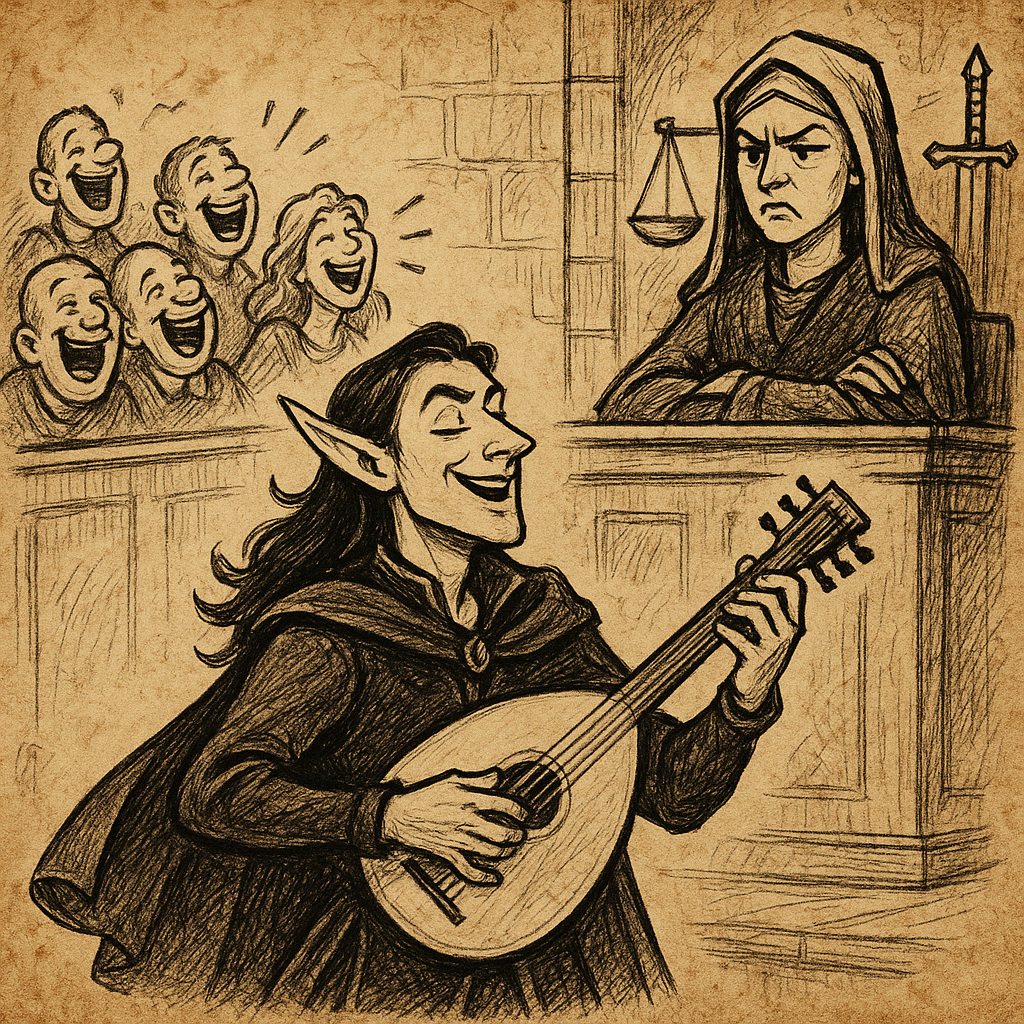The Trial of Thaliel Thornquil (1193 AG)
“I was thirteen when Thornquil stood trial in Blackbriar. My father made me wear my best coat and sit stone-faced through the entire thing. Everyone called it a disgrace. But I remember the laughter… even the judge nearly cracked. That’s when I learned: power fears mockery more than swords.”
— Sorek Redmarch
Overview
In the autumn of 1193 AG, bard and professional menace **Thaliel Thornquil** stood accused in **Blackbriar Proper** of sedition, defamation, and “crimes against dignity”—all stemming from his wildly popular performance of *“The Duke Who Stared at Walls: A Cautionary Dirge”* during the Feast of Saint Hennavar.
The subject of the satire, **Duke Malloran Alairic**, a man famously offended by smiling in public, launched a formal prosecution. The trial became a **spectacle**, with commoners camping outside the courthouse, clergy debating in temples, and nobles privately wagering on whether Thaliel would be executed or knighted by the end.
The Performance That Sparked the Trial
The now-famous verse that began the whole mess:
“He frowns at stone and scowls at sun,
For joy and thought he has but one—
A mirror polished to his pout,
Reflecting glory, and little doubt.”
The ballad lampooned a vain, listless duke whose chief accomplishments included glowering and scheduling portrait sittings. That the description was *barely disguised* only deepened the offense.
The Court and the Charges
The trial was held in the **Sanctum Judicium** in Blackbriar Proper under the watchful gaze of stone reliefs depicting warrior-judges of Stern Alia. The presiding magistrate, **Justice Irmendra Vell**, was a devout servant of Stern Alia known for her rigid adherence to law, her iron braids, and her complete lack of tolerance for “performance in sacred spaces.”
The charges were as follows:
- Seditious performance before a gathered audience
- Defamation of a noble house
- Mockery of divine-sanctioned duty
- Wearing black “in affected mourning of civic virtue”
Thaliel's Defense
Thornquil represented himself. He bowed dramatically to the court, swore by tradition and law, and then opened with:
“If rhyme offends, I shall stand mute.
But silence, I fear, would not suit.
For if we cannot jest with truth,
What separates us from the brute?”
Justice Irmendra promptly warned him against "poetic obstruction of testimony." Thornquil then switched to dry, clipped prose—so clearly painful for him that a court scribe noted he looked “as though his soul were choking.”
His formal defense hinged on the ancient **Lyric Privilege**, an unwritten but long-honored tradition in Gorundia protecting bards who speak truth through satire, provided they incite no rebellion, and name no names outright.
Verdict and Legacy
After three days of public debate, private counsel, and mounting pressure from both the street and certain noble patrons who *secretly enjoyed the performance*, Justice Irmendra Vell issued her ruling:
“Stern Alia teaches us that duty is sacred, but so is truth. The accused has tested patience, propriety, and precedent—but he has not broken the law. Let rulers learn to endure jest, or strive to be unmockable.”
Thornquil was acquitted of all charges.
Aftermath
- Duke Malloran Alairic banned Thornquil from all ducal gatherings. Thornquil framed the decree and sold copies to the public.
- The performance was reprinted under the title *“The Wall-Gazer’s Woes”* and became one of the most widely recited satires in Gorundian bardic circles.
- The trial established what is now called the **Thornquil Precedent**, a cornerstone of the legal tradition protecting bardic immunity in Gorundia.
- Justice Irmendra later authored a reflection on the trial, concluding: “If we silence satire, we train tyranny to speak sweetly.”
Ongoing Impact
To this day, when a bard is accused of overstepping, the question raised in court is often, *“Was it Thornquil-bad, or merely inconvenient?”* Public opinion usually decides the answer long before the judge does.




Comments